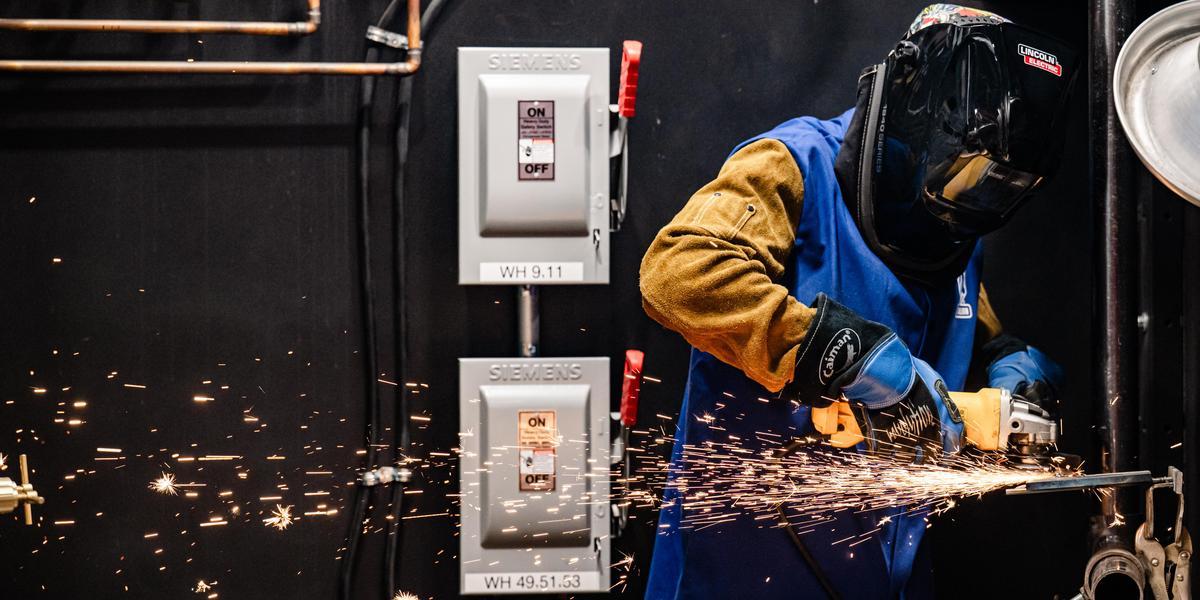
AACC, in partnership with Earlbeck Gases and Technologies, can help you become a welder through state-of-the-art training. Learn the foundations of welding including equipment, tools, drawing symbols, welding codes, metallurgy and inspections. Explore shield metal arc welding, gas metal arc welding, gas tungsten arc welding, oxygen acetylene welding and torch cutting. Help meet the demand for qualified, certified welders in the Baltimore/Washington area and prepare for immediate employment.
Scholarships are available to cover 100% of tuition and materials costs for qualified students.
You'll receive classroom and hands-on training using the latest welding equipment available in the industry. We offer daytime and evening classes in the Clauson Center for Innovation and Skilled Trades at AACC in Arnold and at the Earlbeck Gases & Technologies training facility in Baltimore. Earlbeck is accredited by the American Welding Society. To begin, register for an information session.
At AACC (Arnold): CIT-351
At Earlbeck (Baltimore): STR-301
Prerequisite: Attend a Welding information session
At AACC (Arnold): CIT-352
At Earlbeck (Baltimore): STR-302
At AACC (Arnold): CIT-353
At Earlbeck (Baltimore): STR-303
At AACC (Arnold): CIT-354
At Earlbeck (Baltimore): STR-304
At AACC (Arnold): CIT-355
At Earlbeck (Baltimore): STR-305
At AACC (Arnold): CIT-356
At Earlbeck (Baltimore): STR-306
At AACC (Arnold): CIT-357
At Earlbeck (Baltimore): STR-307
At AACC (Arnold): CIT-341
At Earlbeck (Baltimore): STR-308
Specialize with industry-specific certifications in three common welding processes (STICK, MIG and TIG). You will progress through a series of exercises designed to build upon one another and increase skills levels with the goal of performing an American Welding Society (AWS) certification test.
Want to try welding before committing to training? Welding Basics (CIT-350 and STR-300) is a great place to start!
A highly portable welding process, STICK welding has many applications from construction work and equipment repair to pipe welding. It has the broadest application and is a good foundation for other welding processes. A few of the industries that employ shield metal arc welding include structural and ship building, petroleum pipeline industry, steel erection, construction, nuclear and maintenance/field repair.
Gas metal arc welding is an efficient process that has higher deposition rates making it preferred for manufacturing. Industries that employ gas metal arc welding include automotive repair, manufacturing, shop fabrication, agriculture, pipe fabrication welding and heavy construction.
Gas tungsten arc welding is a precise process with lower deposition rates that can be used for nearly any weldable metal. A few industries that employ gas tungsten arc welding include specialty structural, sanitary pipe welding, aerospace, automotive repair, art and sculpture, and food manufacturing.
Need details? Attend an information session to learn about personalized course options.
If you have any concerns about meeting these requirements, email Lamoth Haynie, lhaynie1@aacc.edu, to learn about additional resources.
Total for Certificate (fundamentals plus one intermediate): $5,520
Fundamentals of Welding (CIT-351 or STR-301): $2,235
Intermediate STICK (CIT-352 or STR-302): $3,285
Intermediate MIG (CIT-353 or STR-303): $3,285
Intermediate TIG (CIT-354 or STR-304): $3,285
Advanced STICK – Pipe (CIT-355 or STR-305): $3,285
Advanced MIG – Pipe (CIT-356 or STR-306): $3,285
Advanced TIG – Pipe (CIT-357 or STR-307): $3,285
Blueprint Reading for Welders (CIT-341 or STR-308): $615
Welding Basics (CIT-350 or STR-300): $295
Scholarships are available to cover 100% of tuition and materials costs for qualified students. Attend an information session to learn more about scholarships.
Upon successful completion of Entry-Level Certificate program, students earn an AACC continuing education certificate for each training (STICK, MIG, TIG) in addition to an American Welding Society (AWS) welder certification.